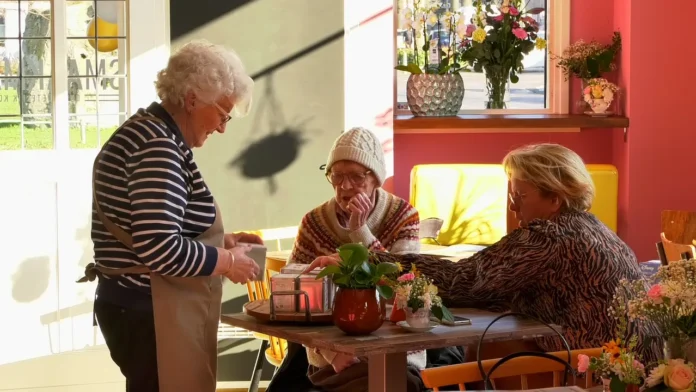At first glance, Smaakmakers in Woensel-West seems like your average coffee shop, but it isn’t. In this newly opened business people with dementia help in the operation. A group of vulnerable people, who are close to the heart of the owners.
The family behind Smaakmakers was itself affected by the disease. Founder Jolande Verbakel experienced up close how her father dealt with the consequences of dementia. However, he wasn’t the type to give up. “My father still wanted to be important,” explains Jolande. However, that turned out to be easier said than done. “Many things that are organized for people with dementia do not suit everyone. My father didn’t want to do crafts or shuffleboard, but still be useful.”
From workshop to coffee shop
It didn’t give her the idea to start a coffee shop yet. That only came later through her daughter and co-founder, Melissa de Laat. She worked in dementia care and organized cooking workshops for people suffering from the disease. The blissful reactions of participants left a taste for more. “I wanted to do something like this more often,” Melissa begins. Brainstorming began. “At first I thought about a catering company, but in the end I decided to start my own coffee shop together with my mother, who worked in the catering industry.”
Smaakmakers became reality through a crowdfunding campaign. The pair raised more than forty thousand euros. The opening of the coffee shop on Edisonplein took place last Saturday. With their own company, the two hope to get people with dementia out of the doldrums.
“You notice in people who are diagnosed that they become very passive, because they think they can no longer do something.” Her daughter adds: “Of course the disease will get worse, but we focus on the period before that. When they can still do a lot.”
Employee of the first hour
An employee (with dementia) from the very beginning is Ellie. She has only had a few working days, but she can no longer live without the company. “It’s very nice here. I don’t want to leave here,” she says with a smile on her face. “I do all kinds of things. For example, if I see something lying around, I clean it up.”
One thing the employees suffering from amnesia are not allowed to do is take orders. This is done via a QR code or at the cash register. “We don’t want it to be too stressful for them. It’s also okay if they bring an order to the wrong table. We also count on a little understanding from the guests.”
Source: Studio040
For Eindhoven News: Lila Mehrez
















